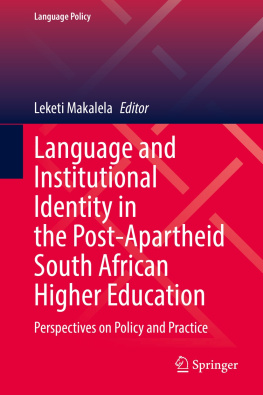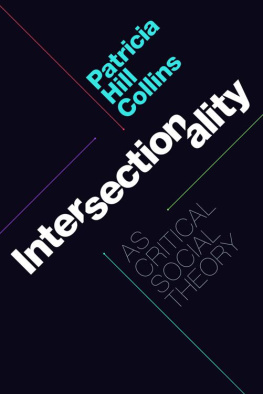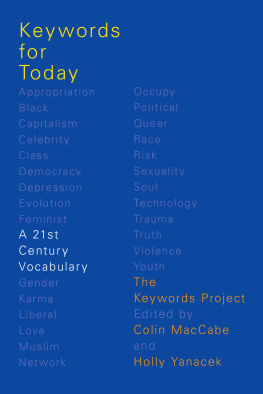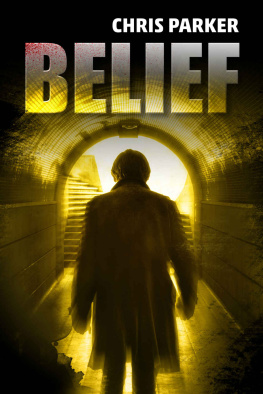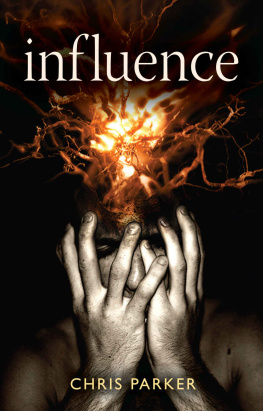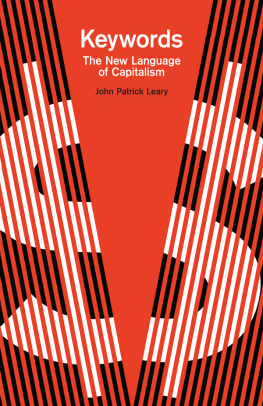Parker Patricia - Shakespearean intersections language, contexts, critical keywords
Here you can read online Parker Patricia - Shakespearean intersections language, contexts, critical keywords full text of the book (entire story) in english for free. Download pdf and epub, get meaning, cover and reviews about this ebook. City: Philadelphia, year: 2018, publisher: University of Pennsylvania Press, genre: Home and family. Description of the work, (preface) as well as reviews are available. Best literature library LitArk.com created for fans of good reading and offers a wide selection of genres:
Romance novel
Science fiction
Adventure
Detective
Science
History
Home and family
Prose
Art
Politics
Computer
Non-fiction
Religion
Business
Children
Humor
Choose a favorite category and find really read worthwhile books. Enjoy immersion in the world of imagination, feel the emotions of the characters or learn something new for yourself, make an fascinating discovery.

- Book:Shakespearean intersections language, contexts, critical keywords
- Author:
- Publisher:University of Pennsylvania Press
- Genre:
- Year:2018
- City:Philadelphia
- Rating:5 / 5
- Favourites:Add to favourites
- Your mark:
- 100
- 1
- 2
- 3
- 4
- 5
Shakespearean intersections language, contexts, critical keywords: summary, description and annotation
We offer to read an annotation, description, summary or preface (depends on what the author of the book "Shakespearean intersections language, contexts, critical keywords" wrote himself). If you haven't found the necessary information about the book — write in the comments, we will try to find it.
Parker Patricia: author's other books
Who wrote Shakespearean intersections language, contexts, critical keywords? Find out the surname, the name of the author of the book and a list of all author's works by series.
Shakespearean intersections language, contexts, critical keywords — read online for free the complete book (whole text) full work
Below is the text of the book, divided by pages. System saving the place of the last page read, allows you to conveniently read the book "Shakespearean intersections language, contexts, critical keywords" online for free, without having to search again every time where you left off. Put a bookmark, and you can go to the page where you finished reading at any time.
Font size:
Interval:
Bookmark:
Shakespearean
Intersections
Language, Contexts, Critical Keywords
Patricia Parker

A volume in the Haney Foundation Series, established in 1961 with the generous support of Dr. John Louis Haney.
Copyright 2018 University of Pennsylvania Press
All rights reserved. Except for brief quotations used for purposes of review or scholarly citation, none of this book may be reproduced in any form by any means without written permission from the publisher.
Published by
University of Pennsylvania Press
Philadelphia, Pennsylvania 19104-4112
www.upenn.edu/pennpress
Printed in the United States of America on acid-free paper
1 3 5 7 9 10 8 6 4 2
Library of Congress Cataloging-in-Publication Data
Names: Parker, Patricia A., author.
Title: Shakespearean intersections : language, contexts, critical keywords / Patricia Parker.
Other titles: Haney Foundation series.
Description: 1st edition. | Philadelphia : University of Pennsylvania Press, [2018] | Series: Haney Foundation series, |
Includes bibliographical references and index.
Identifiers: LCCN 2017054846 | ISBN 9780-812249743
(hardcover : alk. paper)
Subjects: LCSH: Shakespeare, William,
15641616Language. | Shakespeare, William,
15641616Literary style. | English languageEarly modern,
15001700Style. | English languageEarly modern,
15001700Semantics.
Classification: LCC PR3072 .P37 2018 | DDC 822.3/3dc23
LC record available at https://lccn.loc.gov/2017054846
For
my now extended family, with love
Shakespearean Intersections: Language, Contexts, Critical Keywords may call to mind other studies of Shakespeare in relation to the historical and contextualas well as the term made famous in Raymond Williamss Keywords: A Vocabulary of Culture and Society, which began as an envisaged appendix to his influential Culture and Society (1958) but was published only later in 1976. However, the critical keywords in my subtitle here are meant not as a claim to words that were necessarily (or all) key terms in early modern English culture, but as words and phrases that provide a critical way into interpreting the language, contexts, and preoccupations of particular Shakespeare plays, together with issues and historical intersections that have been marginalized or have gone unnoticed by their editors and critics. The combination of critical keywords with historical intersections may also recall Roland Greenes recent study Five Words: Critical Semantics in the Age of Shakespeare and Cervantes, which in turn cites not only Williamss Keywords but also Leo Spitzers Historical Semantics, William Empsons The Structure of Complex Words, and Martin Jays Cultural Semantics: Keywords of Our Time.we will return with regard to race, religion, and sexuality later in this Introductionthe argument could be made that they were simultaneously part of an early modern English cultural semantics, other terms here function at a more local (or subtextual) level.

Each of the chapters engages with overlapping as well as different contexts and intersections, and involves a different ratio or distribution of attention in relation to language, contexts, and close reading. In the process it examines the sodomitical application of spelling backward to the Judaizing of preposterating or turning backward to the Hebrew Testament, in ways important for a play where both orthography (or right writing) and the language of biblical typology are prominently underscored. The broader contemporary contexts for preposterous reversals in this play thus make clear that what might seem the unconnected spheres of reading, writing, orthography, sodomy, and biblical teleology were combined in the polemical abjection of religious (and racial) others; and that in this play and others of Shakespeare, the boundary between language and context is an incontinent divide.
(Mastering Bianca, Preposterous Constructions, and Wanton Supposes: The Taming of the Shrew) begins with the pivotal scene of translation or construction where Bianca appears with Lucentio (disguised as Cambio, master of letters) and Hortensio/Litio, the master of music Lucentio calls a Preposterous ass for presuming to go firstexploring its relation to the stakes in the contemporary context of the proper order of the arts for the order of the genders, and the cambio or exchange within this plays subplot, where Bianca refuses both masters and finally emerges as anything but a tractable wife. It then proceeds to preposterous constructions throughout The Taming of the Shrew, from the micro-level of syntax and discourse to hierarchies of social position as well as of gender, and a major subtextual context that has gone almost entirely unnoticed by its editors and criticsthe simultaneously sodomitical, suppositional, and substitutive resonances of supposes it inherited from Gascoignes Supposes and Ariostos I Suppositi, which plays on both senses of the well-known term that could also mean placed under. And it goes on to examine this major intertextual and interlingual context in relation to its importance for The Taming of the Shrew, including at its end, which leaves open to suppose or critical supposition (as well as construing or construction) the much-debated meaning of Katherines final speech, along with reminders of other kinds of supposition (or sub-position, in the Ariostan sense) in its concluding wordplay on target, butt, and Bianca herself.
befall prepostrously (3.2.121) and the tragic rather than fruitful issue to come from the Athenian marriage of Theseus and his conquered Amazon.
( No Sinister Nor No Awkward Claim: Theatrical Contexts and Preposterous Recalls in Henry V) approaches Henry V from the perspective of the dual theatrical contexts in which it was preceded not only by Richard II and the plays of Henry IV but also by the often-ignored plays of his son Henry VI that had already oft been shown upon our stage (Epilogue 13), in a preposterous reversal of generational and chronological sequence. It then moves to the ramifications for Henry V itself of its preposterous recalls of these Henry VI plays, a perspective that has been missing from even recent criticism that stresses the role of memory and forgetting in Shakespeares dramatic histories. Starting from the Cambridge rebellion of Henry V in a cause whose higher claim to the throne the Henry VI plays had already repeatedly foregrounded, it explores via these earlier plays what ironizes in advance this kings suppression of a rebellion he calls preposterously inspired. And it examines Exeters presentation of Henry Vs own claim to France as neither sinister nor awkward (2.4.85) as a striking rhetorical inversion of Henrys rhetoric of right and proceeding with a rightful hand in a well-hallowd cause (1.2.293).
and the role of the Spanish-named Iago, who refers ironically to himself as a Turk and becomes the plays infidel within.

As the conclusion to this final chapter makes clear, Cymbeline gathers up a wide range of the preoccupations of the other chapters. But all of the chapters here are interconnected by shared language and intersecting contexts, as well as through particular keywords. The contemporary contexts of literacy and humanist learning (along with marriage manuals and conduct books) and the inseparability of grammatical, rhetorical, and discursive structures from issues of gender, sexuality, and social status are central to that make clear why Spanish-held Brabant across the Channel was such a repeated locus of invasion fears in England, while the famous painting in that chapter of the conference that led to Jamess 1604 peace with Spain makes visually apparent the major role played by Brabant in that peace.
Next pageFont size:
Interval:
Bookmark:
Similar books «Shakespearean intersections language, contexts, critical keywords»
Look at similar books to Shakespearean intersections language, contexts, critical keywords. We have selected literature similar in name and meaning in the hope of providing readers with more options to find new, interesting, not yet read works.
Discussion, reviews of the book Shakespearean intersections language, contexts, critical keywords and just readers' own opinions. Leave your comments, write what you think about the work, its meaning or the main characters. Specify what exactly you liked and what you didn't like, and why you think so.

